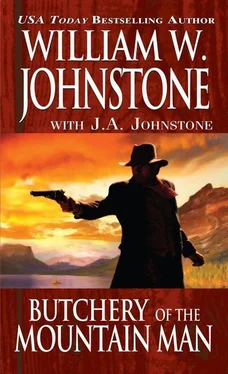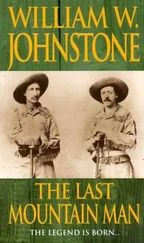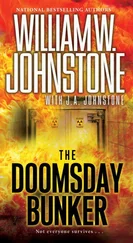“I almost joined one of the trains, but I was only fourteen at the time, and the wagon master would not let me come with them without my parents’ permission. Oh, what an adventure that would have been.”
“I have told him, many times, I am quite satisfied to be making the journey in the comfort of a Palace Car,” Mrs. Upton said.
“Are you a . . . and please don’t take offense, but my curiosity is piqued. Are you a mountain man?”
“No offense taken, Professor. I am indeed a mountain man,” John said.
“But your language, your Bible acumen, that isn’t something one would associate with a mountain man.”
“I am a graduate of the University of Pennsylvania,” John said. “But, I have taken a postgraduate course in mountaineering.”
“My word, a postgraduate course in mountaineering? Where does one find such a course?”
“In Colorado and Montana,” John said. “And I’ve had excellent professors, a man named Preacher, a man named Smoke, and a woman named Hanhepiwi.”
Claire smiled.
CHAPTER TWENTY-TWO
Tau Kappa Epsilon Fraternity House
Smoke was given a position of honor at the head of the table in the dining room of the TKE house. Every member of the fraternity treated him with awe.
“Mr. Jensen, how many men have you killed?” a plebe asked.
“Booker! You are dismissed from the table!” McGrath said, angrily.
“No, please,” Smoke said, holding up his hand. “It’s a legitimate question, given the number of books that have been written about me, and many of them stressing only that part of the story. The truth is, Booker, I’m not quite sure how many men I have killed. It’s not something I’ve ever wanted to keep a tally of, as some perverted badge of honor. But I will say this. I have never killed a man who didn’t need killing.”
“But what gave you the right to determine whether he needed killing or not?” Booker asked.
It was more of a challenge than a question, and everyone sitting around the dining room table looked toward Smoke to see how he would react.
“That is another good question,” Smoke said. “For the most part, survival gave me the right to make the determination,” Smoke said. “I killed men who were trying to kill me. But there have been times when I purposely set out to hunt men down for the sole purpose of killing them.”
“There is no statute of limitations for murder,” Booker said. “Are you afraid that some zealous prosecutor might bring charges against you today?”
Smoke chuckled. “Mr. Booker, do you, by any chance, plan to be a lawyer?”
“Yes, sir.”
“Then, let’s make a deal, right here. If some zealous prosecutor decides that he would like to try me for killing someone like oh, let’s say, Ted Casey, I would like to hire you to defend me.”
“Ted Casey is the one you lynched, isn’t he?”
“Lynched?” Wes said. “Listen, I heard that story firsthand. If ever any man deserved to hang, it was Ted Casey.”
“But he was hung without a trial, wasn’t he?” Booker asked.
“He was.”
“Looking back on it now, would you do things differently?” Booker asked.
“Yes.”
“Ha! I thought so. What would you do differently?”
“I wouldn’t have used a new rope,” Smoke said.
The others laughed, then, when Booker started to speak again, McGrath held up his hand.
“Booker, Mr. Jensen has been more than generous with you. We’ll have no more inquisition.”
“Yes, sir,” Booker said, contritely.
Old Main Building
“How was your lunch?” Professor Armbruster asked.
“Quite interesting,” Smoke replied without further elaboration.
“Well, are you ready to resume the session?”
“I am.”
“We left off with John and Claire going back home,” Professor Armbruster said.
“Yes.”
John’s cabin
After John, Claire, and the baby returned from St. Louis they put in a garden. As John explained, “wild plants will do in a pinch, but there’s nothing improves the table like fresh radishes, onions, tomatoes, lettuce, potatoes, carrots, beans, cabbage, and watermelon.”
John worked hard on his garden, and soon he was raising a bountiful crop. Already they had radishes, and the tomatoes were coming along as well.
Because trapping was nonproductive in the summer, John had a lot of time to work in the garden and he enjoyed it. He also enjoyed Claire’s genuine enthusiasm at seeing the plants grow. She had no experience whatever with gardening, so it was all new and exciting to her.
John was also enjoying his son, particularly the infant’s reaction to everything around him. Claire had made a flute from a sumac branch, and John was learning to play it.
“Now, listen to this, Kirby,” he said, lifting the flute to his lips. He began playing, and to Claire’s surprise, was actually playing a song.
“What is that song?” she asked.
“It is called ‘Old Folks at Home.’ Some call it ‘Suwanee River.’”
“How can you do that? You have not played the flute before.”
John chuckled. “Once you know how to play the scale, the rest is easy,” he said.
He played a few more songs, then handed to flute to Claire, who played music from her background. The music was melodious, consisting of a lot of halftones, but there was a soulful, almost mournful quality to it.
“That was beautiful,” John said when she finished. “What was it?”
“It is a prayer to the Great Spirit. It has words. Would you like to hear them?”
“Yes.”
Claire sang the song, first in her own language, then again, this time in English.
“Oh Great Spirit whose voice I hear in the winds
Whose breath gives life to the world
I come to you as one of your many children
I am small and weak.”
“Why, that is beautiful, Claire,” he said. He embraced her. “I never thought, when I left Pennsylvania, that I would wind up with an Indian woman, let alone, that I would fall in love with her. I love you, Claire.”
“I did not think I would ever love,” Claire said. “It is only a word, I thought. But you have taught me that it is much more than a word.”
John embraced her again, then he heard the sound of approaching horses, and he separated from her, and, picking up his rifle, stepped out in front of his cabin. It wasn’t that he feared every sound, but the cabin was so remote that any visitor became suspect.
There was only one direct approach to the cabin, and he jacked a round into the chamber of his rifle and watched, and waited.
He saw a body of men approaching and he knew, immediately, that they were soldiers. He assumed they might be lost, and he put his rifle down, and waited until they approached. What he saw was eight soldiers, being led by a lieutenant.
“Excuse me, sir. Are you John Jackson?” the lieutenant asked when they reached the front of his cabin.
“I am. What can I do for you, Lieutenant?”
“Mr. Jackson, I am Lieutenant Murphy, from Fort Shaw. Major Clinton’s compliments, sir, and he wonders if you and your wife would do him the honor of paying a visit to the fort?”
“Would this be anything more than a courtesy call, Lieutenant?” John asked.
“I believe the major has a favor he wishes to ask of you, sir. But I have not been made privy to what that favor might be.”
“All right, Lieutenant Murphy, we’ll join you,” John said.
“What is it?” Claire asked when John went back into the cabin.
“Major Clinton wants us to pay a call on him at Fort Shaw,” John said.
“Why?”
“I don’t know, the lieutenant didn’t say. I’m not sure he even knows. But, it’s never a bad thing to have a good relationship with the military, so I think we should go.”
Читать дальше












